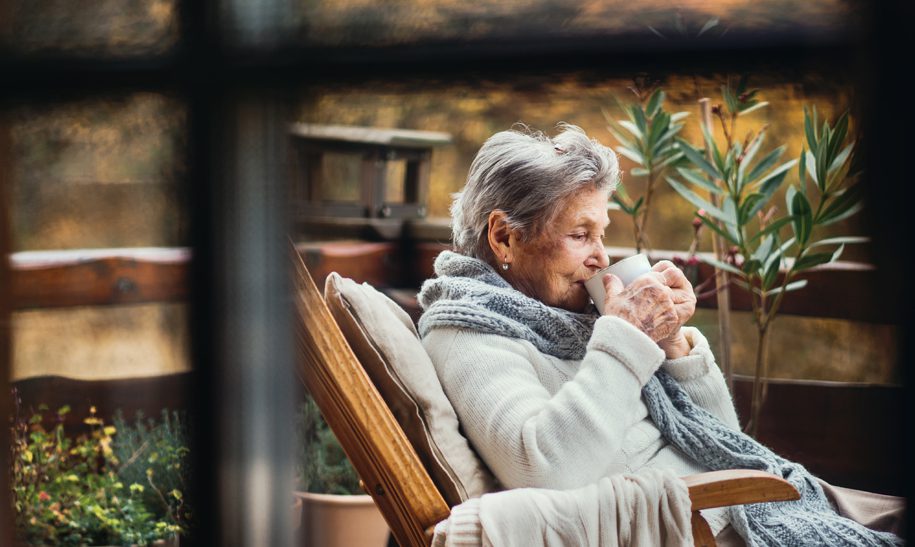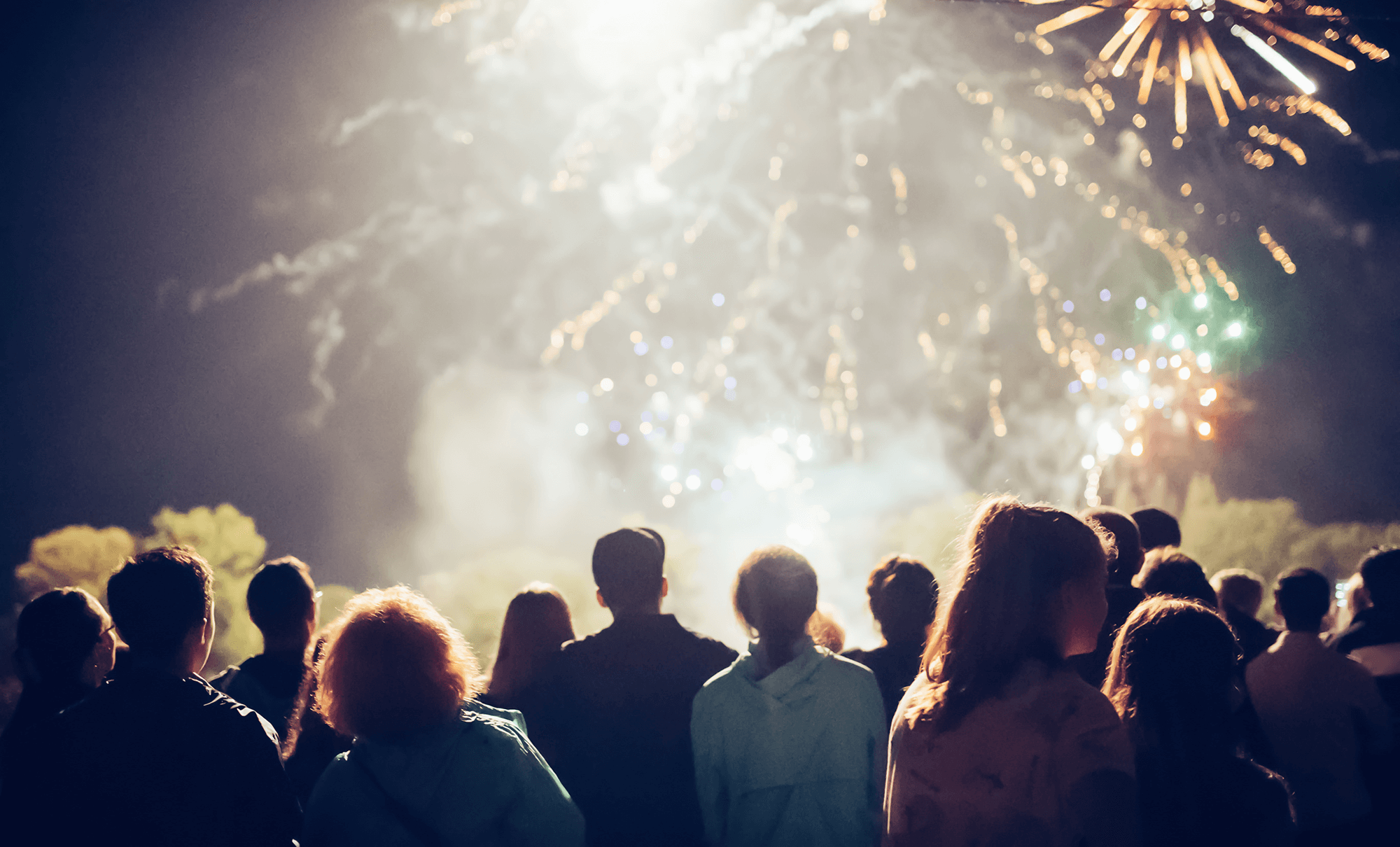Dementia and fireworks – safety tips for older people on bonfire night
Tags
Articles
Bonfire night celebrations are held across the UK around the 5th of November. While this is an enjoyable time for many, some find fireworks distressing, and extra measures may need to be taken to help them feel safe and happy at home.
Why can bonfire night and fireworks be distressing for an older person?
There are a number of reasons. The loud bangs and sudden flashes of firework displays, and the smell of smoke can take those who did military service back to frightening times. Sometimes, even the happy shouts of people celebrating bonfire night may be misinterpreted as something bad and cause confusion or panic.
For older people living with heart conditions, or conditions that affect breathing such as asthma, bronchitis or COPD, the smoke and toxic fumes from bonfires and the particles left in the air from fireworks could make symptoms worse, causing them to cough more than usual, experience chest pain, or feel lightheaded.
Do fireworks affect dementia?
Yes they can do according to the Alzheimer’s Society. Dementia can sometimes make it difficult to identify and understand sounds – so loud noises can be frightening. People with dementia can find communication and concentration tricky when there is a lot of unexpected noise too. The flashes, and excess activity outside can also be confusing, which in turn could upset their nighttime routine and increase sundowning symptoms such as agitation or insomnia.
How to help older people stay safe during bonfire night and firework displays
Understand the potential distress
If you’ve not experienced this annual celebration with the person you’re caring for before, ask them how they feel about fireworks, and if it’s likely to upset them. Be sure to ask family members for advice too.
While bonfire night is officially on the 5th of November, celebrations are often held anytime within the first two weeks of November. If they’re likely to cause distress to the person you’re looking after, it can help to find out when local firework displays are happening, and to ask neighbours if they are planning to set off fireworks, and if so what time. Most local authorities advise the fireworks cannot be set off after midnight. If you hear fireworks going off after this time and it’s causing distress, try calling the non-emergency police number 101.
If neighbours are planning on setting fireworks off and it’s likely to be distressing for the person you’re supporting you may wish to take them elsewhere – such as out for a quiet meal, or to visit friends or family.
Create a calm home environment
Try closing the curtains a little earlier than usual, especially if you’re close to a public bonfire event, and are likely to have more traffic or people in the streets outside.
Closing all windows, and putting a favourite film, or engaging television programme on with the volume turned up can help to drown out the noise and may help a person with dementia feel more comfortable. Some people also find using a white noise machine helpful.
If there are any pets in the home they may find fireworks upsetting – which in turn could cause upset the person you’re looking after. Walk dogs early in the day to help them feel tired and less distressed in the evening, and make sure cats are kept safely indoors once it starts to get dark.
If the person you’re caring for would like to watch the fireworks, it may be safer to encourage them to watch from inside the home so that they’re not startled by the noise, or at risk of getting too cold from standing outside for a long period of time.
Why not try...
Switching a household fan or dehumidifier unit on creates white noise, which can sometimes block out some firework sounds. A number of phone apps designed to aid sleep have a range of calming sounds such as gentle rain, or waves on a beach, which may also help or act as a distraction. Playing calming music could help too.
Plan alternative activities
If the elderly person you’re caring for wants to be involved in the festivities but without attending an event, A bonfire night dinner could be a fun alternative fireworks night.
You could play videos of firework displays on television at a comfortable volume and make some favourite foods and drinks you’d likely find at a bonfire night such as jacket potatoes, hotdogs, soups and hot chocolate. For those with dementia this may help bring up happy memories of bonfire nights past. This can be a great opportunity for family to come and spend time together too.
If your loved one enjoys arts and crafts, there are lots of fun tutorials online for firework paintings. This can be a nice way to mark the day and evoke memories without stepping out in the noise and the cold. This tutorial uses simple brushstrokes, while this one uses a printing technique with paper toilet rolls.

Only attend professionally organised events
Many older people do enjoy getting out and joining in firework celebrations. If you find this is the case, it’s important to attend firework displays and bonfires that are professionally organised and managed, with proper safety regulations in place.
While it may be tempting to visit a friend or neighbour who is putting on their own display in the garden, it’s much more difficult to stay a safe distance away from the fireworks and falling debris.
A professional event should comply with safety measures from the local council and fire service, and may even have fire services on site. Some of these measures include –
- Building the bonfire a safe distance away from sheds, fences and trees.
- Checking there are no overhead cables above or around the bonfire
- The bonfire has a suitable barrier around it, and spectators are kept at least 5 metres away at all times
If you’re attending an official event, be sure to check with the organisers that suitable parking and accessibility arrangements are in place too. Parking is often some distance away from where the main event will be held, and the ground may not be suitable for walking aids or wheelchairs, especially in the dark and if it’s been rainy.
High visibility clothing can help keep everyone safe if you’re walking in the dark or along the side of a road. Take a torch too. While a mobile phone torch can work in a pinch, it may not illuminate enough of the area in front of you, so you may want to invest in a larger handheld one.
Ear defenders and ear plugs can be bought online and may help dull some louder noises and protect sensitive ears.
Wrapping up warm in enough layers of clothing is important too, as you’ll likely be standing outside for a while. Taking hot beverages in a flask can help, but avoid caffeinated drinks like tea or coffee – instead try something soothing such as soup, hot cocoa, or herbal tea.
Finally if your loved one struggles to stand for long periods check with organisers if you can bring a comfy seat / folding chair. Some don’t allow this for safety reasons so it’s important to confirm the rules before you head out.
Look for events using low noise fireworks
Over the last few years low noise fireworks have become more widely available in the UK as they’re a lot kinder to older and vulnerable people. They’re also less likely to upset pets who can also find fireworks scary. While it’s impossible for a firework to be completely silent, they are considerably quieter and are often paired with music for a more comfortable experience.
Most supermarkets now stock low-noise fireworks, and more and more public events are using them each year too. For example each year events in Epsom Beckenham and Salford hold low noise fireworks displays before their main displays.
Follow the NHS' firework safety rules
If you’re attending a professional event, there are still some actions you can take to keep yourself and those around you safe. The NHS advise –
- Never approach a firework once it has been lit, even if it looks like it’s gone out
- Never smoke around fireworks
- Follow safety instructions carefully if using sparklers
- Light sparklers one at a time and wear gloves
Read our latest blogs
Browse the latest blogs and tips on living well in later life.